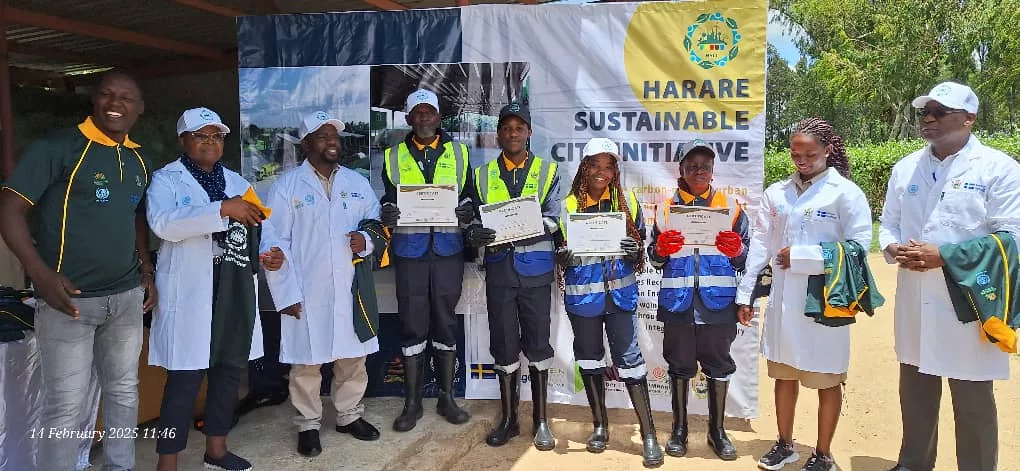Waste pickers from Epworth, Harare Showground, Tafara, Highfields, and Mabvuku have been trained in waste sorting, reducing, recycling, reuse, and management.
Addressing graduates during the awarding of certificates and handover of protective clothing at the Mabvuku-Tafara Multi-clean Energy Centre today, Engineer Herbert Parichi, the Director of Infrastructure Planning and Environmental Management in the Office of the Minister of State for Provincial Affairs and Devolution for Harare Metropolitan Province, on behalf of his Minister, Hon Senator Charles Tawengwa, said the government is in full support of such environmentally sustainable initiatives.
“Within the dictates of NDS1and in the spirit of devolution, Harare Metropolitan Province, together with the civil society groups are taking purposeful steps in the management of waste in Harare Metropolitan Province. On this note, this waste sorting site at Tafara, we appreciate what the Civil society groups are doing in conjunction with the City of Harare and the government. Through such successful engagements with UN-Habitat and its implementing partners like Zimbabwe Sunshine Group, we have made meaningful steps towards women’s capacitation such as sewing training and waste sorting training. We applaud this cause.
“In the tenets of leaving no one and no place behind, waste pickers from Epworth, Showground, Tafara, Highfields, and Mabvuku have been trained on waste sorting. This enhances the waste value chain and waste cycle economy by reducing, recycling, and reusing waste. The Government is in full support of environmentally sustainable initiatives as they fall within the dictates of National Development Strategy 1. The Government calls for strengthening Private Public Partnerships in our enhancement towards smart cities initiatives,” Engineer Parichi said.
Speaking during the tour of the facility, Mr. Ronnie Mbaisa, the Executive Director of the Zimbabwe Sunshine Group, applauded the City of Harare
for providing the facility with a big skip bin and constantly coming to collect waste from the site.
“This means that we don’t have any illegal campsites where people just go through their waste but they are now utilizing the city of Harare’s skip bin. This means that this project can not run on its own. It needs the full support of the City of Harare because they understand issues of how to dispose of the materials that we do not recycle.
“We also have a borehole on this site where community members come to fetch water. We’ve realized that this is a very small borehole and the water demand is very high, especially when we are now entering the off-season for rain,” Mbaisa said.
At the Clean Energy Center, there are plans to purify the water to make the projects self-sustaining. There will be a small water shop when a 50-kilowatt solar system is installed. It will also provide lighting and power to meet all the energy needs on the site.
“The interesting thing is that already the community is willing to pay for the water in small amounts which is good for sustainability. Establishing a water purification facility would go a long way in providing portable water for drinking because, at the moment, most of them boil it to make sure that it’s 100 safe,” Mr. Mbaisa added.
On the social aspect of the project, there is a look-and-learn area that is used for demonstrating some of the products that are generated
every day like glasses of wine which become waste at the end of the day.
Christmas decorations, plastic containers, and CDs also become waste at the end of the day but sculptures can produce table tops or other designs.
On the other hand, organic waste is used as manure in the garden.
“Biodegradable waste is turned into manure used to have nice gardens. If you look at the value chain, waste is coming as waste but the biodegradable one is turned into manure used to grow crops like tomatoes which will be sold to people again. We are also considering hydroponics to make sure it becomes a center of excellence when it comes to the value chain of waste,” Mbaisa added.
Addressing the same gathering, Alexander Chileshe, the UN-HABITAT Project Manager pledged to work with partners like the Zimbabwe Sunshine Group from the beginning until the success of the centres.
“We are not going to walk away. We will start with you until this place works because our role as project managers is to make sure that we move from this level to another level. My prayer is that you will be here moving with us because we need you. We will do our best to provide support to this project until it works.
“In the next few weeks, we should begin digging the foundation for the site because our interest is to make sure that this place becomes a full-fledged recycling center. That is what it must be but without you, it will not work. You had already started the fire. Our job is just blowing to keep the fire burning. We will do our best to work with you and whatever issues you are facing, and through ZSG, please let us know so that we see how best we can work together to ensure that this place continues to function,” Chileshe added.
Patricia Mukudu, the Cleaning Superintendent for Region 5 in the City of Harare, hailed the multi-stakeholder collaboration in reducing, recycling, and managing waste.
“I would like to thank the UN-Habitat and the Zimbabwe Sunshine Group and other stakeholders like Sober Life for coming on board. In the past, we faced financial challenges. Now there is money. It was not easy to get this place place work. We were fighting in the offices and with everyone opposed to this idea but now we are working together.
“The project is now taking shape. Anyone willing to come on board, anyone who wants to assist, anyone who wants to work with us is free to come on board. It’s everyone else’s responsibility. It’s not for the City of Harare alone; it’s not the residents alone but everyone else should come on board,” Mukudu said.






